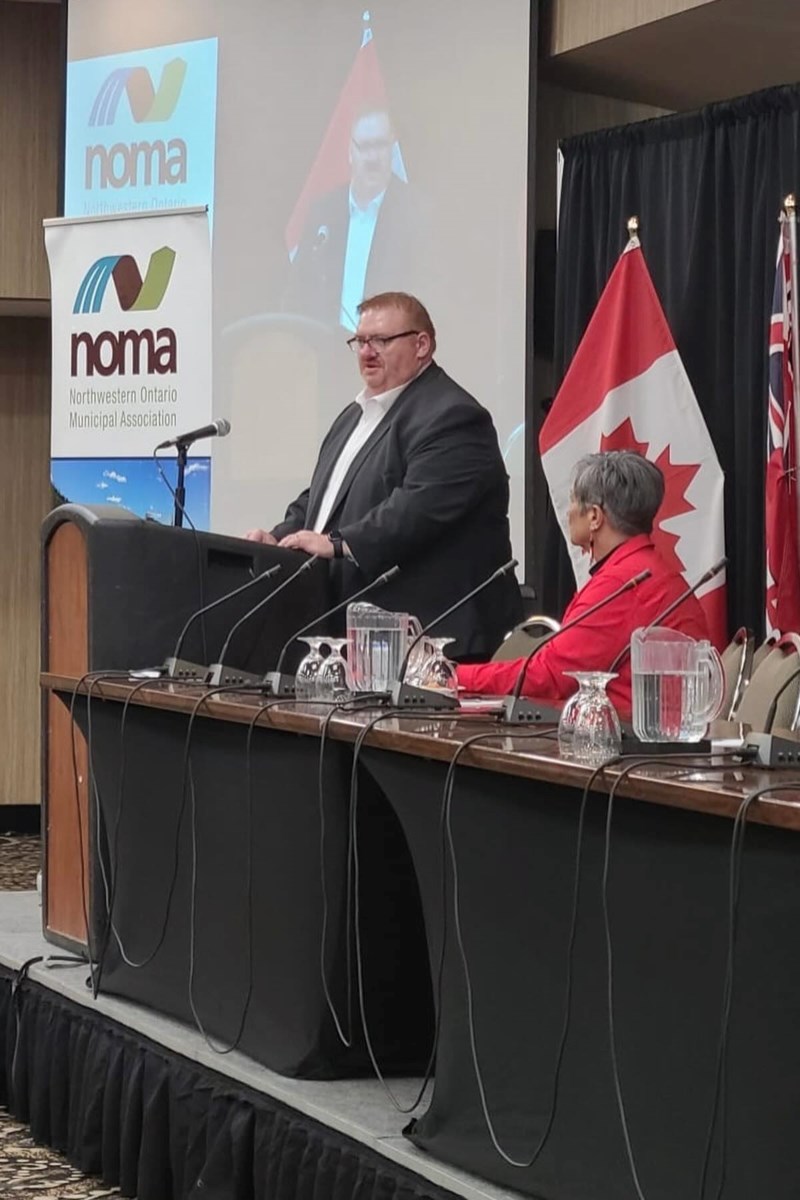Graydon Smith says provincial government will not give up on the people of Terrace Bay
TERRACE BAY — The provincial government is providing some clarity in the face of questions surrounding the idling of Terrace Bay’s mill.
Ontario’s minister of natural resources and forestry, Graydon Smith, gave a speech at the Northern Ontario Municipal Association (NOMA) conference in Thunder Bay on April 25.
Smith spoke with Dougall Media to provide updates about how his ministry and the Ford government are approaching the situation in Terrace Bay.
It was earlier this month Premier Doug Ford appeared in Thunder Bay and said the provincial government is going to work with former AV employees to “retrain” them and “find them new opportunities,” seemingly implying the plan was to close the mill for good.
Smith, however, indicated that they have not given up on the possibility of reopening the mill.
“It continues to be very top of mind every day for us. We’re thinking about those workers and families in Terrace Bay — the communities all around Terrace Bay and all of the communities that are impacted further out throughout the forestry sector.
“It continues to be job one for us to work very hard to find some people out there who are interested in that mill. It’s an anchor for northwestern Ontario but at the same time as we do that work, it’s important for us to be making investments in the future of the forestry sector as well,” Smith said.
One such investment is Ontario’s recent pledge of $80 million over four years towards biomass projects as part of a strategic approach to business in the forestry sector.
Smith indicated that discussions between Aditya Birla Group — which owns the mill in Terrace Bay — and potential buyers are “ongoing” and, although the province’s involvement in those discussions is limited, he and his ministry are doing everything they can to ensure the “prosperity of northwestern Ontario.”
“As a government, we’re the facilitator trying to put two parties together and say, ‘How can we help make this work?’” Smith said.
He added that he recently met with municipal representatives, Indigenous leaders, and workers from across the region to provide them with updates and have an open discussion about the mill and the far-reaching impacts of the idling.
“I think the takeaway from that meeting was a very positive one. We reassured everybody that we are doing all we can and we will leave no stone unturned to try and get that mill out of idle and active again,” Smith said.
Mayor Paul Malashewski told Dougall Media the meeting with Smith left him feeling optimistic.
“We had a good conversation about what’s going on in the forestry industry in this area. Minister Smith said he’s committed to getting Terrace Bay up and running and recognized how important the mill is to our community,” Malashewski said.
“I think that Minister Smith is doing what he can. AV has to start talking to people instead of leaving people hanging. When we talk to them, they don’t give us too many answers. They have to start talking to the government, to the unions, to other people who may be interested in purchasing the mill.”
Malashewski also addressed how residents and business owners in Terrace Bay are faring four months after the mill idling.
“So far they’ve been holding out okay. I haven’t really seen any real negative effects yet but it’s been four months — quite a few people have gotten new jobs. Hopefully, it will come to an end soon,” he said.
He further alluded to the fact that time is of the essence, with sawmills in White River and Hornepayne — which used to send their wood chips to Terrace Bay —experiencing a backlog.
He said White River has about 1,600 loads of chips and Hornepayne has around 1,200 loads with nowhere to send them at present.
“Sooner or later, the sawmills are going to have to go down, too, and that’s putting more people out of work,” Malashewski said.
Hornepayne Mayor Cheryl Fort echoed Malashewski’s optimism about their meeting with Minister Smith and spoke from her own point of view about the impact Terrace Bay’s mill idling is having on her community.
“The chips that our sawmill produces, there’s no place to bring them now. The challenge is that where we can bring them — to Quebec or Dryden — is the distance. That is a huge struggle,” she said.
“In the long term, our mills are at production. We don’t want them to reduce their production because they have no place to put the chips. The pulp and paper mill in Terrace Bay was a strategic link for Northern Ontario as a whole, so we need it to reopen.”
That being said, Fort said she’s hopeful about recent talks between Hornepayne Lumber, White River Forest Products, and other paper and pulp mills in the region such as Thunder Bay Pulp and Paper.
“Right now, I’m encouraged by the people who run White River Forest Products and Hornepayne Lumber — that they will continue to find solutions — but we need a collaborative approach from the provincial government and all of the people involved from all of the affected communities. Let’s find a solution not only for the people who are losing jobs but for the community of Terrace Bay. We’ve got to work together to keep the North strong,” she said.
— SNNewswatch
This article was published by: Austin Campbell, Local Journalism Initiative Reporter
Visit the original article here



